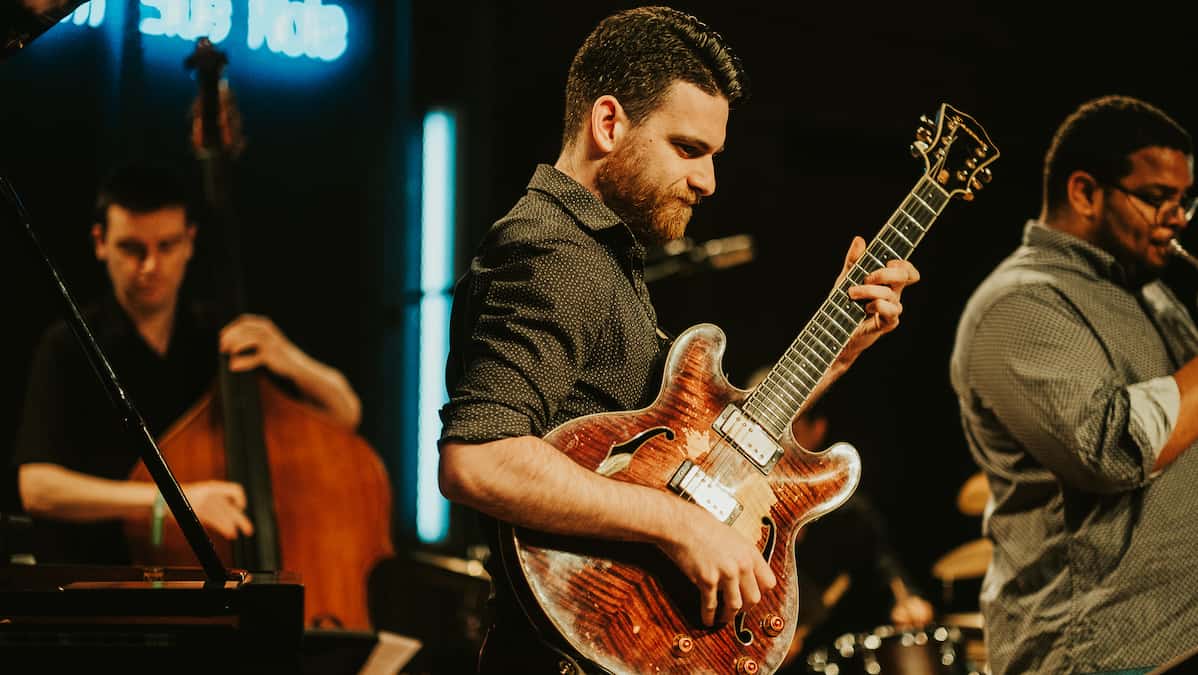Columns
Close the Book! Learning Music by Ear

#3 – Practice your scales in new ways
Practice your scales! Ok…DUH, but now I want you to work on them in entirely new ways. Have you played all your major scales beyond 3rds? Practicing in 4ths, 5ths, 6ths, 7ths and beyond can give you a new perspective in hearing larger intervals within a key center. A crucial step in learning music easily by ear is identifying the contour of melodies. High vs. low. Small intervals vs. big leaps. How about using new rhythms to creatively practice a scale? What if you played a G major scale but only the “and (&)” of 1 and 3. Or used just the rhythms of a melody applied to a scale? Take a look at these examples.

#4 – Sing, sing, sing!
You’ll hear this a lot, but using your voice no matter how “tone-deaf” you think you are is a seriously important tool in connecting your ear to your instrument. Our voice is a powerful weapon since we can usually sing back musical phrases and rhythms pretty quickly upon hearing them a few times or even once. Use your own imagination to practice call-and-response between your voice and your instrument. Sing a simple melody within a scale/key and play that back to yourself. If you can’t do it, get simpler. 3 notes. Long rhythms. Small intervals. Then slowly graduate to more complex combinations.
#5 – Read music
Wait what??? I thought this whole article was about NOT reading…well, yes. Sort of. I’m not saying you need to abandon the art of musical comprehension by sight. It IS a very important skill, however, we want to make sure you don’t use it as a crutch. You should still devote time in developing this skill, BUT. Try this out. Find a piece of music you want to learn. Before you dare pull out your axe please find a recording or five and just LISTEN. Spend time focusing on a different element. Notice what you like about the performance. Can you identify the key, tonality, or strong melodic/rhythmic motifs? Hone in on one instrument at a time. Jot down the elements you’d like to emulate or expand upon in your own interpretation of it. What is it that inspires you to want to learn this? Now take this informed listening experience and apply it to the instrument. I’d certainly bet that your ability to learn the notes on a page has sped up significantly since you’ve exposed yourself to what the music SOUNDS like, and not LOOKS like. You play the music. Not the other way around.
Practical Observations
The bulk of my work as a professional musician has been gigging for the better part of a decade. In that time I’ve had the great fortune of performing in a myriad of musical environments from Union pit productions, wedding/cover bands, touring rock/funk/soul groups and all sorts of Jazz configurations. The biggest impression left on me from my own idols and mentors is the importance of having a very strong ear, and the ability to learn lots of music quickly. My experiences as a sideman across many genres and scenes has solidified the fact that I internalize music much better when I initially spend the effort learning it entirely by ear. This skill is one of the biggest reasons why a musician can keep getting calls and referrals. In the past 3 or so years I’ve made a conscious effort to prepare for every gig through complete memorization. Although it was a lot of work at first to learn entire sets and hours of music, I ultimately put myself in a better position to really retain the information. This is especially important in my position when I sometimes sub for a band only every few months. Instead of having to relearn everything, go back through charts, or read on the bandstand, I’m able to “spot check” parts of songs and spend a lot less time prepping and a lot more time having fun and being in the moment when it matters most.
If your goal is to play within a certain style effectively you have to immerse yourself in it. Even if you have a strong ear, you won’t be transcribing complex modern jazz melodies, harmonies and rhythms if you don’t have a strong understanding of its history, language, analysis and recordings. These basic ideas on developing your ear can be expanded and utilized in learning all styles and levels of music.
Even in musical productions where your ability to read is crucial, I find that the best musicians in the pit are the ones that have their ears wide open and their eyes out of the book. Just because a sheet of paper “tells” you what’s going to happen next, does not mean it WILL happen. You want to be the one that can fix something on the fly by ear, instead of being flustered and shuffling through your book.
Remember, music is a very special form of art and expression that is uniquely personal and powerful to both the performer and listener.
Don’t let anything get in the way of that. Even if you have no aspirations of playing professionally, I encourage you to progress your musicality through your ear first and foremost. Challenging yourself is the only way to get better. Now, go learn somethin’ dangit!
More Zakk Jones JGT Lessons HERE
-
Jazz Guitar Lessons1 week ago
New JGT Lesson: Dissecting Versions of Gershwin’s “Our Love Is Here To Stay”
-
Jazz Guitar Lessons3 weeks ago
New JGT Lesson: Common Chord Grips, Voice Leading, Quartal Harmony, And Many Other Techniques
-
Jazz CD Releases4 weeks ago
John Scofield Touring – Supporting His Latest Album, “Uncle John’s Band”
-
What's Happening in Jazz2 weeks ago
New York City Braces for the Electrifying Inaugural Guitar Masters Festival



















